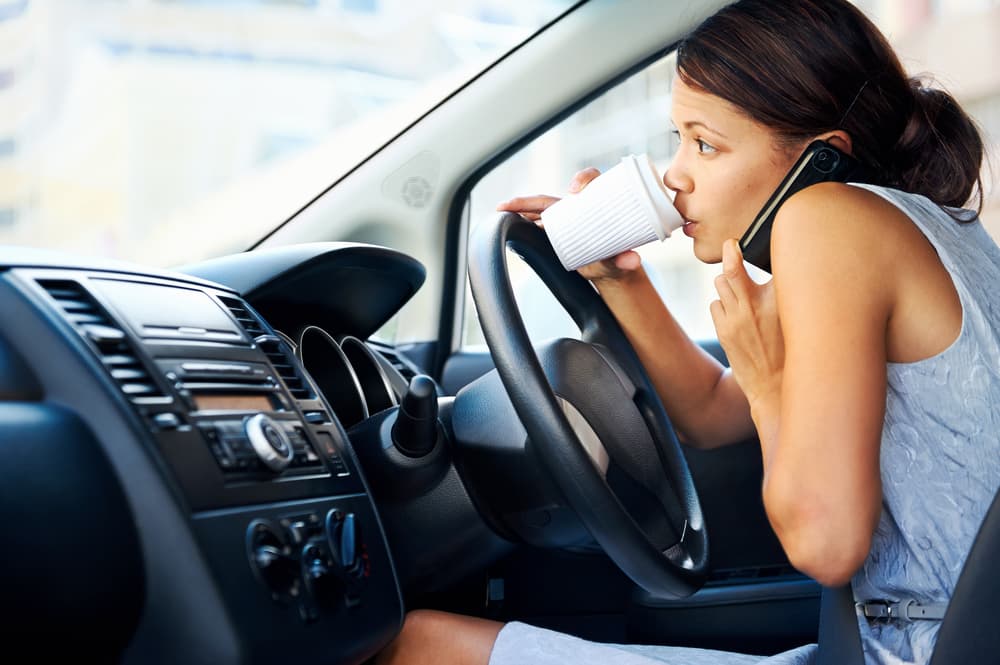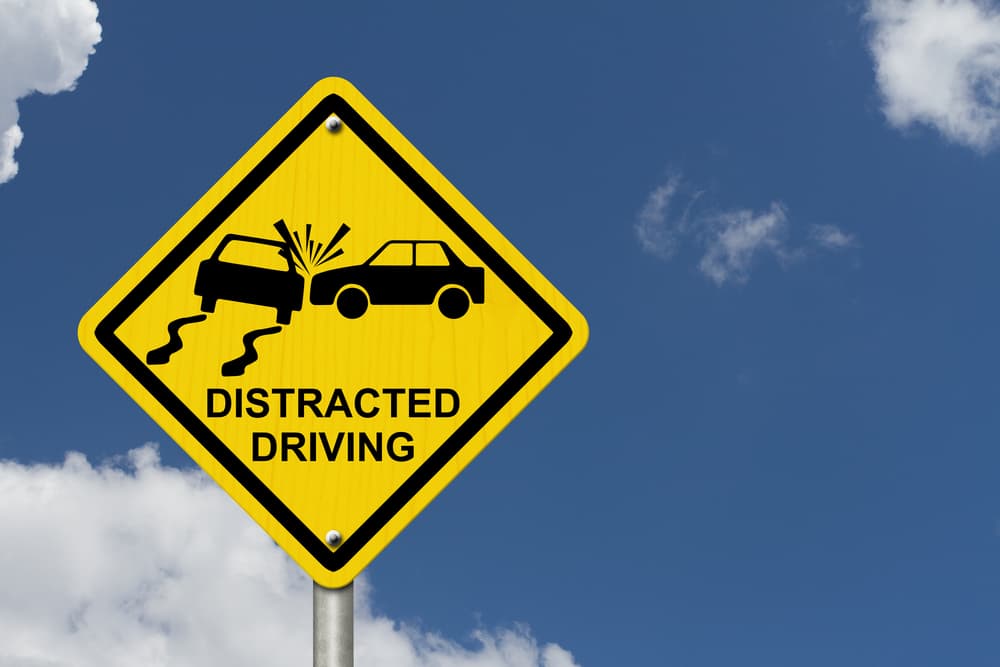What Are the Most Common Types of Distractions While Driving: Your Quick Guide
Distracted driving is a leading cause of accidents and injuries. Even seemingly harmless distractions can have serious consequences. By understanding what are the most common types of distractions while driving, you can stay safer on the road and learn your rights if you're injured due to someone else’s negligence.
Read on to discover more about common driving distractions, their impact, and what to do if you’ve been affected. If you find yourself needing to pursue a legal claim by the end of this blog, don’t hesitate to consult a Fort Lauderdale car accident attorney at our law firm.
Reach Out Today!
The 3 Main Categories of Driving Distractions

Before we get into what are the most common types of distractions while driving, let's discuss the three main categories of driving distractions.
Understanding these categories can help you recognize dangerous situations and how to avoid them.
1. Visual Distractions:
These take a driver’s eyes off the road, even for a brief moment. This can include:
- Using a phone (texting, talking, browsing)
- Looking at a GPS or navigation system
- Checking the radio or climate controls
- Looking at the scenery or other cars
- Eating or drinking
- Grooming or applying makeup
2. Manual Distractions:
These take a driver’s hands off the wheel, which can reduce their ability to control the car. Some examples include:
- Using a phone (texting, talking, browsing)
- Eating or drinking
- Smoking
- Reaching for something in the back seat
- Adjusting the radio or climate controls
3. Cognitive Distractions:
These happen when a driver takes their mind off of driving. Some instances that may be considered cognitive distractions include:
- Talking to passengers
- Daydreaming
- Thinking about stressful or emotional things
- Listening to loud or distracting music
What Are the Most Common Types of Distractions While Driving Today?
Now that you know the three categories of distractions, let's focus on what are the most common types of distractions while driving in today’s hectic world. Modern technology and fast-paced lifestyles have amplified many distractions that drivers face.
Here are some of the most common ones drivers deal with:
Talking on the phone:
Talking on the phone, whether hands-free or handheld, presents a cognitive distraction that impairs the driver's focus on the road, reducing their ability to react to potential hazards.
Texting, checking email, etc.:
Engaging in activities such as texting, checking emails, or using social media on mobile devices poses significant dangers while driving. These actions divert the driver's attention from the road, increasing the risk of accidents.
Daydreaming:
Allowing the mind to wander while driving is a common cognitive distraction that can lead to loss of focus on the road and potential accidents.
Reaching for items:
Reaching for items that have fallen or are out of reach while driving creates a manual distraction, taking the driver's hands off the wheel and diverting their attention from driving safely.
Paying attention to children in the back:
While it's important to ensure the safety of children in the car, excessive attention to them while driving can be distracting. Drivers must strike a balance between attending to their safety and maintaining focus on the road.
Listening to engaging podcasts or audiobooks:
Listening to podcasts or audiobooks can enhance long drives but may also serve as a cognitive distraction if they capture too much attention, diverting focus from the road and increasing the risk of accidents.
Eating and drinking:
While eating or drinking may seem harmless, it can require the driver to take their hands off the wheel and divert their attention from the road, increasing the risk of accidents.
Personal grooming:
Engaging in personal grooming activities such as fixing appearance or applying makeup while driving is highly dangerous, as they demand visual and manual attention, diverting focus from safe driving practices.
Arguing with passengers:
Disagreements or disputes happen during car journeys, but managing these situations without compromising driver concentration is essential to avoid distractions and maintain safe driving practices.
Some of these activities might not seem like a big deal until another driver gets distracted for just a moment and ends up crashing into your car. Sadly, a lot of drivers don't realize how dangerous distractions are until it's too late, and they need to pay for serious accidents and injuries.
Types of Collisions Due to Distracted Driving
Distracted driving isn't just an annoyance; it can be a threat to your safety on the road. When drivers take their eyes, hands, or mind off the task of driving, the risk of a collision skyrockets.
These collisions can range from seemingly minor fender benders to devastating crashes with catastrophic consequences.
Common Collision Types and Their Dangers:
Rear-end collisions:
These are common occurrences when distracted drivers fail to maintain a safe following distance. Texting, in particular, steals attention and reaction time, often leading to moderate to severe injuries for those involved.
Side-swipe collisions:
When a driver's focus drifts, they may unintentionally stray into another lane, causing major damage to vehicles and endangering other drivers.
Intersection accidents:
Traffic signals and oncoming vehicles become invisible to distracted drivers, leading to devastating T-bone collisions or failure-to-yield situations.
Beyond Drivers: Protecting Pedestrians and Cyclists:
The impact of distracted driving extends far beyond fellow motorists. Pedestrians and cyclists, often considered the most vulnerable road users, face an even greater danger when drivers aren't fully present.
A moment of inattention can mean the difference between life and death for someone simply trying to cross the street or enjoy a bike ride.
Every Distracted Driving Collision Matters:
While some collisions may appear minor, the physical, emotional, and financial consequences can be significant and long-lasting. Seeking immediate medical attention and legal help can make a serious difference when it comes to proper care and compensation.
What Are the Consequences of Distracted Driving?

Distracted driving is a pressing concern because it jeopardizes the safety of both drivers and other road users.
When drivers divert their attention from the road, they heighten the risk of making critical errors and responding inadequately to potential dangers.
Some key risks associated with distracted driving are:
1. Increased Likelihood of Accidents:
Distracted driving contributes significantly to the occurrence of accidents annually. According to the National Highway Traffic Safety Administration (NHTSA), in a recent year, distracted driving resulted in the deaths of 3,522 individuals in the United States alone.
2. Reduced Reaction Time:
Distractions impair a driver's ability to promptly respond to changing road conditions. This impairment manifests as delayed braking, failure to avoid obstacles, and an elevated risk of rear-end collisions.
3. Impaired Judgment:
Engaging in distractions while driving compromises a driver's judgment and decision-making capabilities. Consequently, drivers may exhibit poor lane control, neglect to yield, and engage in other unsafe driving behaviors.
4. Increased Likelihood of Severe Injuries:
Accidents stemming from distracted driving tend to result in more severe injuries. The lack of attention and diminished reaction capacity elevate the risk of life-threatening injuries for both the distracted driver and other road users.
Holding a Driver Liable for Your Losses After a Distracted Driving Accident
An accident with a distracted driver can feel like a world-altering event. However, holding the responsible driver accountable can play a role in your recovery.
With that being said, looking for legal representation after a distracted driving accident is your first step towards securing the compensation you deserve. Your lawyer will work tirelessly to build a strong case that proves:
Negligence:
This means demonstrating that the driver breached their duty of care by engaging in distracting activities like texting while driving. This breach directly caused the accident and your injuries.
Direct Causation:
Your lawyer will link the driver's actions to your specific injuries and damages, leaving no room for doubt about the accident's cause and its consequences.
Evidence:
Building a strong case relies on gathering evidence.
Your lawyer will collect everything that supports your claim, including:
- Police reports: These offer essential details about the accident scene and the initial investigation.
- Eyewitness testimonies: Statements from individuals who witnessed the accident and the driver's behavior can be invaluable.
- Medical records: These provide a detailed record of your injuries and the treatment you've received.
- Expert analysis: Depending on the specifics of your case, accident reconstruction specialists or medical professionals can provide insights.
Seeking legal representation is not just about financial compensation. It's about holding the negligent driver accountable, preventing similar tragedies from happening to others, and taking a crucial step toward your own healing process.
Securing Compensation for Your Injuries and Losses
When you've suffered an injury in a distracted driving accident, you deserve to be compensated for your physical, emotional, and financial losses. That's where a skilled car accident lawyer comes in. They'll help you with:
Finalizing Compensation:
Your lawyer will assess your losses, including medical bills, lost wages, pain and suffering, and any other accident-related expenses. They'll fight to ensure you receive the maximum compensation you deserve, covering both immediate and long-term needs.
Taking on Insurance Companies:
Dealing with insurance companies can be stressful and confusing. Your lawyer will handle all communication and negotiations, advocating for your best interests and ensuring you receive a fair settlement.
Fighting for Your Rights:
Your car accident lawyer will handle all legal matters, ensuring your rights are protected every step of the way. This allows you to focus on your health and well-being without additional stress.
Talk to a Car Accident Lawyer About Your Distracted Driving Case Today
Keep in mind that there are time limits for filing personal injury lawsuits (usually around 1-4 years). Missing the deadline could cause you to lose out on compensation that you need.
Working with an experienced car accident attorney means you benefit from their know-how in handling car accident cases. For help with your distracted driving case, we encourage you to reach out to a personal injury attorney at our law firm today.